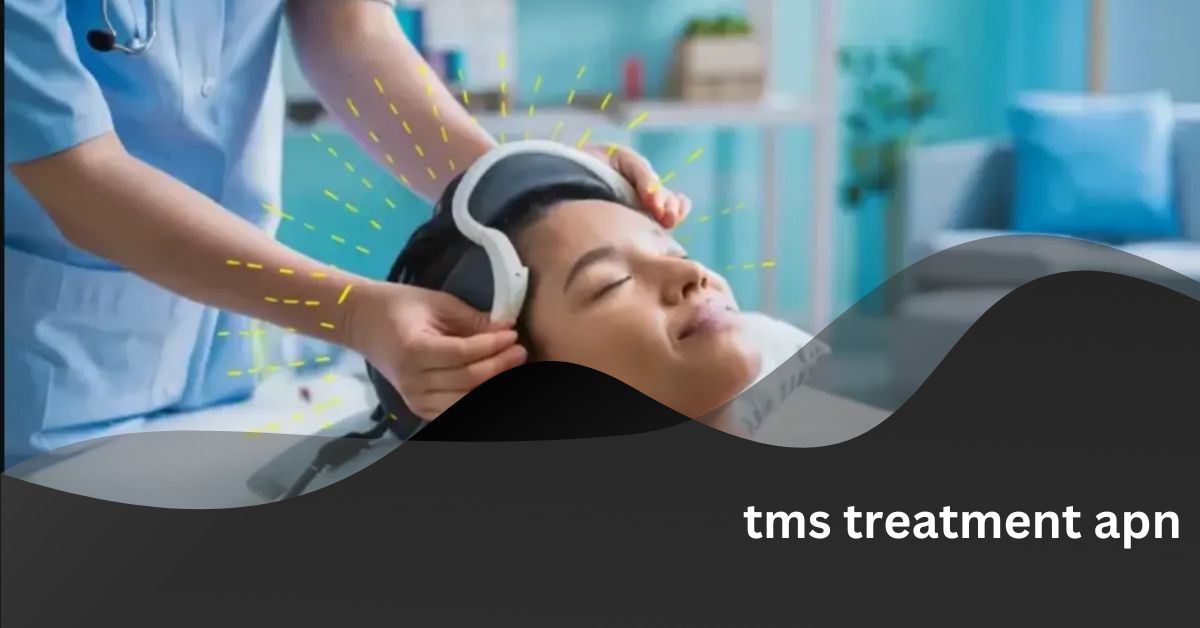Mental health care has evolved significantly over the past few decades, with new treatments emerging that offer hope to those suffering from persistent conditions like Major Depressive Disorder (MDD), Obsessive-Compulsive Disorder (OCD), and anxious depression. One such groundbreaking treatment is Transcranial Magnetic Stimulation (TMS). This non-invasive therapy has opened up new avenues for treatment-resistant mental health disorders. In this article, we’ll explore TMS treatment, with a particular focus on the role of Advanced Practice Nurses (APNs) in administering this therapy. We’ll dive into its effectiveness, benefits, and how APNs contribute to the successful delivery of TMS treatment.
What is TMS Treatment?
Transcranial Magnetic Stimulation (TMS) is a form of brain stimulation therapy that uses magnetic fields to stimulate nerve cells in the brain. Unlike more invasive treatments like electroconvulsive therapy (ECT), TMS does not require anesthesia, making it a more accessible option for many patients. TMS is most commonly used to treat depression, especially in patients who have not responded to traditional treatments like medication and psychotherapy.
How Does TMS Work?
TMS involves placing an electromagnetic coil on the patient’s scalp, near the forehead. This coil generates magnetic pulses that stimulate nerve cells in the region of the brain involved in mood regulation. The goal of TMS is to activate underactive areas of the brain in patients suffering from depression, thereby improving their symptoms over time.
The Role of Advanced Practice Nurses (APNs) in TMS Treatment
Advanced Practice Nurses (APNs) play a crucial role in the delivery of TMS treatment. These highly trained professionals are responsible for a variety of tasks, including patient assessment, treatment planning, and the administration of TMS therapy. Their advanced education and training allow them to provide specialized care, ensuring that patients receive the most effective treatment possible.
Patient Assessment and Treatment Planning
Before initiating TMS therapy, APNs conduct thorough assessments of patients to determine their suitability for the treatment. This involves evaluating the patient’s medical history, current symptoms, and any previous treatments they have undergone. APNs use this information to develop a personalized treatment plan that meets the specific needs of each patient.
Administering TMS Therapy
APNs are often directly involved in the administration of TMS therapy. They ensure that the TMS device is properly calibrated and positioned, monitor the patient’s response to the treatment, and make any necessary adjustments to the therapy protocol. This hands-on involvement helps to maximize the effectiveness of the treatment while minimizing any potential side effects.
Efficacy of TMS Treatment
One of the most compelling aspects of TMS treatment is its effectiveness, particularly for patients who have not found relief through other methods. Clinical studies have shown that TMS can significantly reduce symptoms of depression, with some patients experiencing complete remission. The success rate of TMS has led to its growing popularity as an alternative to traditional mental health treatments.
Long-Term Benefits
In addition to its immediate effects, TMS treatment offers long-term benefits for many patients. Studies have indicated that the positive effects of TMS can last for months or even years after the completion of therapy. Some patients may require maintenance sessions to sustain these benefits, but overall, TMS offers a promising option for long-term mental health management.
Benefits of TMS Treatment APN
The involvement of Advanced Practice Nurses in TMS treatment adds an additional layer of care that enhances the overall patient experience. APNs bring a unique blend of clinical expertise and personalized care, making them invaluable in the treatment process.
Personalized Care
APNs are known for their patient-centered approach to care. In the context of TMS treatment, this means that patients receive individualized attention throughout their therapy. APNs take the time to understand each patient’s unique needs and concerns, ensuring that the treatment plan is tailored to achieve the best possible outcomes.
Comprehensive Support
Beyond the technical aspects of administering TMS, APNs provide comprehensive support to patients. They offer guidance on managing side effects, coping with the emotional aspects of treatment, and navigating any challenges that may arise during therapy. This holistic approach ensures that patients are supported both physically and emotionally throughout their treatment journey.
TMS Treatment: Beyond the Basics
While TMS is a well-established treatment for depression, there are still many aspects of this therapy that are not widely understood. By exploring these lesser-known aspects, we can gain a deeper appreciation for the potential of TMS and the role of APNs in its delivery.
TMS for Other Mental Health Conditions
While depression is the most common condition treated with TMS, this therapy is also being explored for other mental health disorders. For example, studies have shown that TMS may be effective in treating OCD, anxiety disorders, and even certain types of chronic pain. As research continues, it is likely that the applications of TMS will expand, offering new hope to patients with a variety of conditions.
The Future of TMS Treatment
The field of TMS treatment is rapidly evolving, with new developments constantly emerging. Advances in technology are making TMS devices more sophisticated and easier to use, while ongoing research is uncovering new insights into how TMS works and how it can be applied to different conditions. As these trends continue, the role of APNs in delivering TMS treatment will likely become even more important, as they will need to stay up-to-date with the latest developments and adapt their practice accordingly.
conclusion:
Transcranial Magnetic Stimulation (TMS) represents a significant advancement in the treatment of mental health conditions. With its non-invasive nature and impressive success rate, it offers a valuable alternative for patients who have not found relief through traditional treatments. Advanced Practice Nurses (APNs) play a key role in the delivery of TMS therapy, providing both the technical expertise and personalized care needed to ensure successful outcomes. As the field of TMS continues to grow, the contributions of APNs will be essential in helping patients achieve better mental health and an improved quality of life.
FAQs:
How does TMS differ from other treatments for depression?
Unlike medications or electroconvulsive therapy (ECT), TMS is non-invasive and does not require anesthesia. It also specifically targets areas of the brain involved in mood regulation, which can lead to more effective results for certain patients.
What role do Advanced Practice Nurses play in TMS treatment?
APNs are involved in all aspects of TMS treatment, from patient assessment and treatment planning to administering the therapy and providing ongoing support throughout the treatment process.
Is TMS treatment effective for everyone?
While TMS has shown great promise, it is not effective for everyone. Success rates vary, and some patients may require additional treatments or maintenance sessions to achieve lasting results.
Are there any side effects of TMS treatment?
TMS is generally well-tolerated, but some patients may experience mild side effects such as headache or scalp discomfort. These side effects are usually temporary and subside shortly after treatment.
How long does a typical TMS session last?
A typical TMS session lasts between 30 to 60 minutes. Patients usually undergo multiple sessions over several weeks to achieve the desired results.
Can TMS be used to treat conditions other than depression?
Yes, research is ongoing to explore the use of TMS for other conditions such as OCD, anxiety disorders, and chronic pain. However, its use for these conditions is still considered experimental.
What should I expect during a TMS session?
During a TMS session, you will sit in a chair while an electromagnetic coil is placed on your scalp. You may hear a clicking sound and feel a tapping sensation on your head as the magnetic pulses are delivered.
Is TMS treatment covered by insurance?
Many insurance companies cover TMS treatment, particularly for depression that has not responded to other treatments. It’s important to check with your insurance provider to understand your coverage options.
What is the long-term outlook for patients who undergo TMS treatment?
The long-term outlook for TMS patients is generally positive, with many experiencing significant improvement in their symptoms. Some may require maintenance sessions to sustain the benefits, but overall, TMS offers a promising option for managing chronic mental health conditions.
How does TMS treatment compare to traditional antidepressant medications?
TMS treatment differs from traditional antidepressant medications in that it is a non-drug approach and focuses on stimulating brain areas involved in mood regulation rather than altering chemical imbalances.



